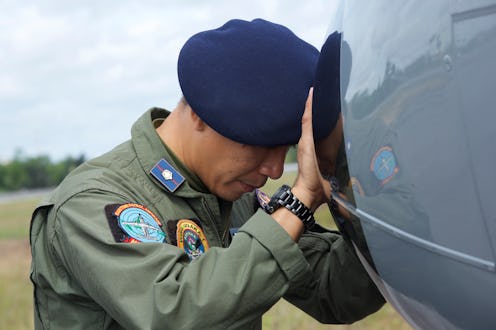News
Why Did AirAsia Flight QZ8501 Crash?
After cockpit records were recovered in the wreckage of AirAsia Flight QZ8501 last week, more information has been released regarding what might have been the cause of the plane's disappearance over the Java Sea. The plane was issuing multiple emergency warning alarms that drowned out the pilots' voices in the recording, but auditory records point to no threat of terrorism because no explosions or gunfire were heard, investigators said. As Indonesian officials continue to piece together the damage, they've discovered that the plane ascended at a rate six times as fast as the normal speed at which commercial jet climbs.
While planes like the one used for Flight QZ8501 usually tend to climb at a rate of 1,000 to 2,000 feet per minute, records show that QZ8501 ascended at 6,000 feet per minute. Aviation expert Mary Schiavo points to a combination of poor weather and a potential updraft that caused the plane to rise at a rate that, according to Indonesia Transportation Minister Ignasius Jonan, even exceeds the speed of a fighter jet. Schiavo says that those warnings being emitted throughout the cockpit might have meant little in the face of conditions entirely outside of the pilots' control.
If the aircraft got caught in an updraft, the pilots might not have been aware at first of why it was climbing so quickly when they weren't inputting that into the controls... The pilots would have had control of the plane but may not have even realized what was occurring because of the confusing readings from the aircraft.
AirAsia Flight QZ8501 was a mere 40 minutes into its relatively short two-hour flight from Surabaya to Jakarta when pilots requested to climb 6,000 feet higher than their altitude of 32,000 feet in an effort to avoid storm clouds. Due to high air traffic, the pilots were told to wait by air traffic control, who were unable to reach them after they'd made their initial request.
As families of passengers await additional news, the Indonesian government is still a week away from issuing an preliminary report expected on Jan. 28. Rough waters in the Java Sea have made it nearly impossible for rescue crews to retrieve the remainder of the victims; so far, they've recovered 53 passengers out of 162. According to search and rescue operations coordinator Suyadi Bambang Supriyadi, divers are currently unable to reach the bottom of the sea due to high tides and dangerous currents. It is expected to take a full year before a final crash report is published.
Images: Getty Images (1)
